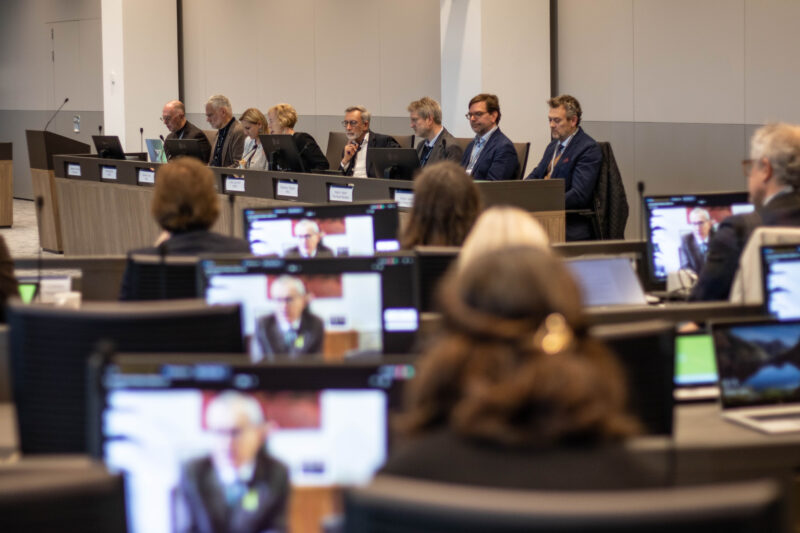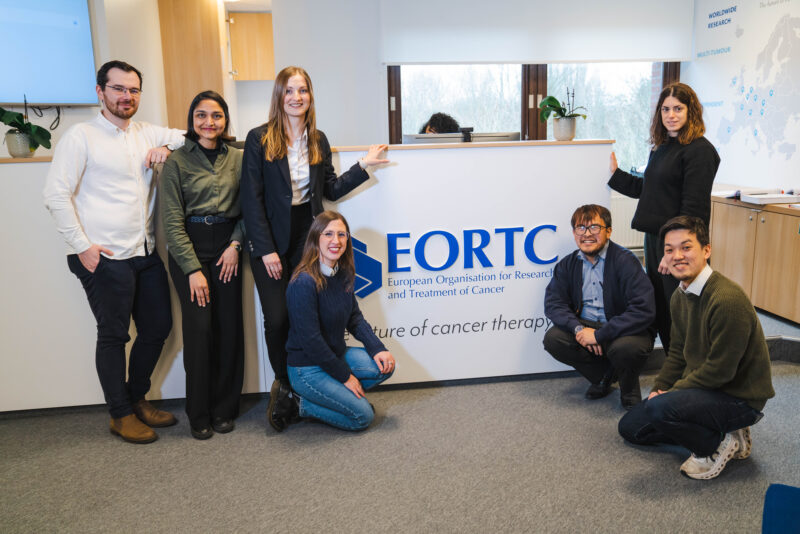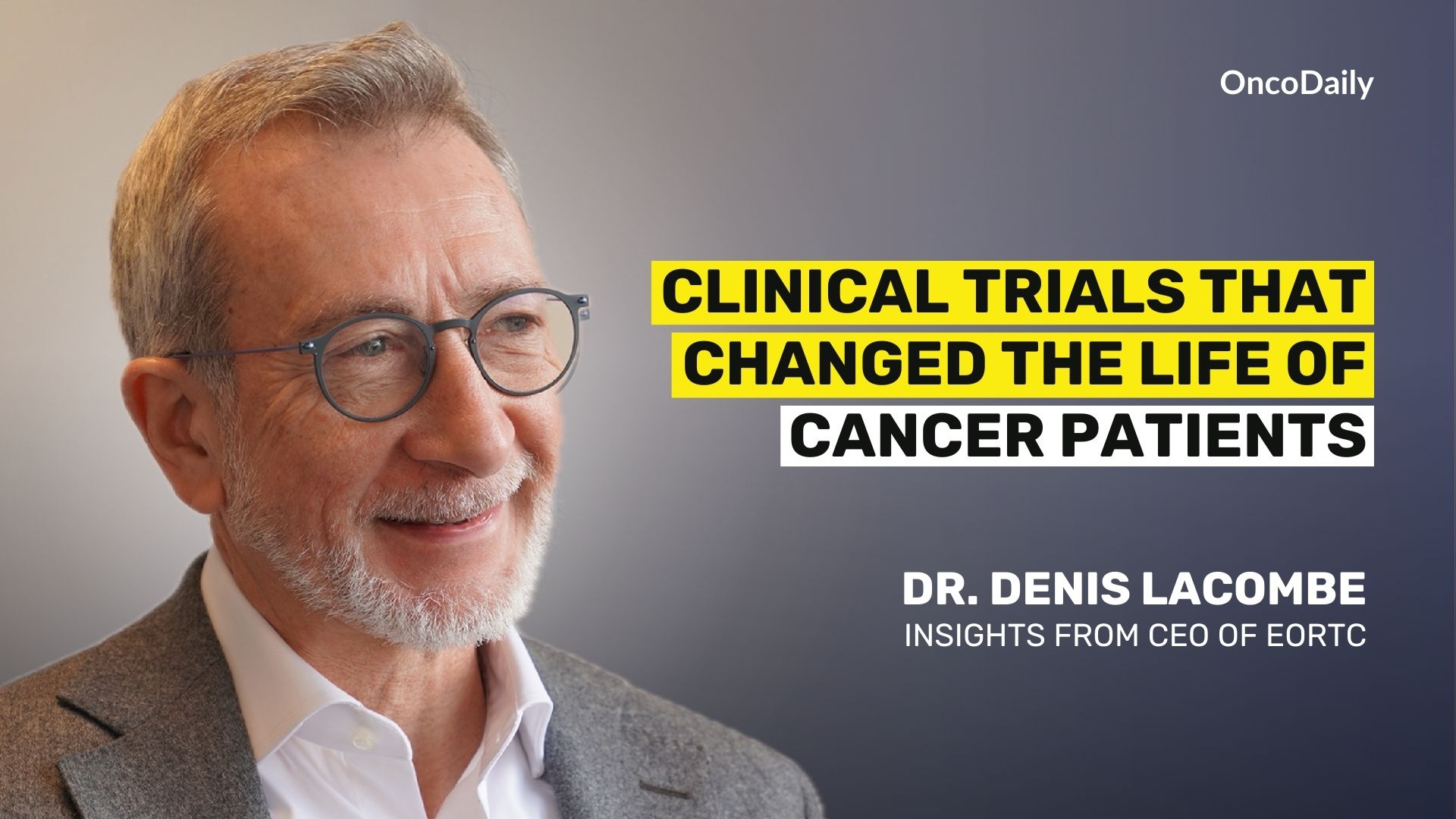Cancer research is at the forefront of medical innovation, with the European Organisation for Research and Treatment of Cancer (EORTC) making significant impacts across Europe and beyond. In a recent interview, Dr. Denis Lacombe, CEO of EORTC, discussed the organization’s latest efforts, which focus on patient-centered research, inclusion of underserved populations in clinical trials, disparities in cancer care, and AI, pointing out that collaboration, patient education, and inclusivity are key to advancing cancer research for a better future.
The Long-lasting History of Changing Practice for Cancer Patients
For the past 60 years, EORTC has been a leading organization in cancer research in Europe, conducting clinical trials that have shaped multiple treatment protocols. “EORTC has a long-lasting history of changing practice for cancer patients. We have had clinical trials that changed the life of cancer patients,” Dr. Lacombe noted.
EORTC does not rest on its laurels. Building on a globally recognized legacy, the organization continually advances with new initiatives that directly impact patient care and treatment protocols. “It’s very high on our agenda to address practice-changing clinical trials.” Dr. Lacombe highlighted a recent example of their work, “Two weeks ago at the ESMO congress, EORTC was featured in a plenary session, a presidential session, with one of these trials for prostate cancer,” he stated.
EORTC: A Pioneer in Patient-Centered Research
When asked how EORTC ensures its research remains patient-centered, Dr. Lacombe highlighted their focus on the quality of life and survival of cancer patients. He stated, “Our agenda has always been survival and quality of life of cancer patients. So, I guess more patient-centric than this is quite difficult to do.” Dr. Lacombe also emphasized the organization’s deep commitment to patient involvement and integration of patient feedback into the clinical trial process, noting, “We have a patient panel involved in all our research and protocol development.”
Educating Patients with Cancer & Caregivers
According to Dr. Lacombe, patient education has always been a priority for EORTC. The organization develops courses on clinical research specifically for patients, which are validated by patients themselves. “We were really pioneer in organizing specific courses on clinical research for patients, we want them to understand what a protocol is, what clinical research is… Needless to say, that each of our protocol, patient information, leaflet, everything that is aimed at patient is developed and validated by patients,” he said.
This focus on education extends to caregivers, who are integral, particularly when it comes to special populations like the elderly and pediatric patients, who often rely on family members for decision-making and emotional support. “What we do for patients is open to caregivers …We help them understand the benefits, rights, and duties involved in being part of a clinical trial,” Dr. Lacombe added.
Supporting Special Populations in Cancer Research
Special populations are often underrepresented in cancer research. Dr. Lacombe shared that ensuring inclusivity in clinical trials is another key mission at EORTC, especially for special populations like elderly patients, those with rare cancers, and individuals with disabilities. EORTC has developed specialized programs that focus on these populations. “For instance, in our sarcoma research, we involve young adults, and we have a special program for elderly … We want to leave no one behind,” Dr. Lacombe noted.
One significant initiative aimed at broadening participation is the focus on pragmatic clinical trials. As Dr. Lacombe explained, these trials “welcome as many patients as possible,” even those who might be excluded by the rigid criteria of traditional trials. “We try to have very wide inclusion criteria to reflect what is happening in real life,” he added, highlighting EORTC’s effort to ensure that clinical research reflects real-world situations, encompassing a broad spectrum of patient demographics.
EORTC also work closely with pediatric-focused organizations like the International Society of Pediatric Oncology (SIOP) to ensure children are also represented in clinical research. “There’s no need to duplicate what they do very well,” Dr. Lacombe said, but EORTC makes sure that young adults and adolescents, who often fall between pediatric and adult oncology, are included in research efforts.
Rare Cancers: Addressing the Unmet Needs
Patents with rare cancers are another population that is often underrepresented in clinical trials, which, in turn, results in limited treatment options and scarce data on effective treatment options and prognosis for these patients. Dr. Lacombe highlighted the importance of addressing rare cancers, he said, “For rare cancers, we try to cover as much as possible.” He also mentioned Arcagen, a study designed to define the molecular landscape of rare cancers to guide treatment options. “We collected data from almost a thousand rare cancer patients across 10 different rare cancers. And for each of them, we have the molecular makeup, as much as we can do, and we could actually give a recommendation to these patients,” Dr.Lacombe shared.
As with all other aspects of cancer research, in the case of rare cancers, EORTC strives for collaboration and knowledge exchange to find the best possible solutions. “On October 16th, we are going to have a large meeting where we invite, key opinion leaders, the EU Commission, the European Medicines Agency (EMA), and patients to discuss what the paradigm shift should be for rare cancers in the future,” Dr. Lacombe said.
AI and Personalized Medicine: The Future of Cancer Care
EORTC is also embracing cutting-edge technologies such as artificial intelligence (AI) and personalized medicine. “I think artificial intelligence and new technology come in all our activities, just by the fact that this organization basically collects a lot of data from so many patients that, of course, data science is at the center of our activities … And for instance, for radiation oncology, where we acquire a very sophisticated data sets, computerized images, artificial intelligence is critical to understand, analyze and interpret the data,” Dr. Lacombe explained.
Personalized medicine is another area where EORTC is making strides. “Cancer is not necessarily addressed by organ anymore; it’s fragmented within an organ,” said Dr. Lacombe. With more and more cancer treatments tailored to the molecular makeup of individual patients, particularly in rare cancers, personalized medicine has become a game-changer.
Collaboration in Clinical Cancer Research
Collaboration is at the heart of EORTC’s work. Dr. Lacombe believes that clinical research in oncology has become too complex for any one organization to tackle alone. “It’s beyond the means of any organization. We need to collaborate,” he said, citing partnerships with institutions from Canada, Australia, the United States, and Japan.
This global approach is particularly important in rare cancers. As Dr. Lacombe explained, “We need all data, not only from the EU, to come up with innovative solutions and improve cancer care.” One such collaboration, the TOPGEAR trial, a practice-changing clinical trial initiated by Australian researchers and expanded to Europe through EORTC. Conversely, the United States National Cancer Institute is now partnering on an EORTC led clinical trial addressing retroperitoneal sarcomas.
 Cancer Medicines Forum (CMF) workshop organised by the EMA and EORTC on 5 April 2024, under the auspices of the EU Belgium Presidency
Cancer Medicines Forum (CMF) workshop organised by the EMA and EORTC on 5 April 2024, under the auspices of the EU Belgium Presidency
Addressing Disparities in Cancer Care
Despite advancements, significant disparities in cancer care remain, particularly in access to clinical trials for marginalized groups. Dr. Lacombe acknowledged these challenges and stressed the importance of pragmatic clinical trials with wide inclusion criteria. “We should do much better for patients,” he said. “Clinical trials should reach the patients where they are. Patients don’t have to travel to where the clinical trial is, we have to make the procedures of clinical trial much, much easier”
He also pointed out the financial barriers that prevent certain populations from participating in trials. “Clinical trials have become too expensive. In that respect, it’s sometimes challenging to open clinical trials everywhere we want and de facto, poorer countries, get excluded,” he said, emphasizing the need for policy reform to make trials more accessible, particularly in resource-limited settings.
By Giving Less, We Can Give to More: Overtreatment in Cancer Care
Despite significant advances in cancer care over recent decades and the availability of various treatment modalities, finding the right treatment option and dosage for each individual remains a challenge. “There is no one-size-fits-all. We are lucky because we have many therapeutic options, but we also know that they are expensive, that it’s not easy to give access to everyone. So, I think it’s an additional reason to make sure that we understand which treatment we give to each individual, so that we don’t give a treatment that they don’t benefit. Maybe they have the toxicity, but also by avoiding treatments that are ineffective for certain individuals, we can save recourses and allocate them towards providing more options for other patients,” Dr. Lacombe emphasized.
Defining the right treatment option for the patient is not the only challenge out there. Finding optimal dosage is another concern. “I’ve been recently very much inspired by a clinical trial done by the Tata Memorial Hospital in India, where basically they gave six percent of the dose of immunotherapy, six percent of the dose we give, so much less, and they have a survival benefit. So, by giving less, they can give to more, and they still have the survival benefit for more patients. So, I think we also have to think in the future of oncology about over-treatment,” Dr. Lacombe stressed.
The above-mentioned example further underscores the critical need for ongoing evaluation of a drug’s effectiveness, dosage, and safety even after its approved. ‘I always say that when a drug is approved, the work is not finished. The work starts, actually,’ Dr. Lacombe emphasized.”
A Message to the Next Generation
Dr. Lacombe is equally passionate about inspiring the next generation of oncologists and researchers. EORTC offers special training programs to Early Career Investigators. “What we want to teach them is how to collaborate, how to work together across disciplines,” he said. This spirit of collaboration, he believes, is essential to advancing cancer care and research. “We are looking for people willing to do that extra mile to push the standard of care of tomorrow.”
 EORTC Fellows
EORTC Fellows
EORTC under Dr. Denis Lacombe’s leadership is pushing the boundaries of cancer research through innovation, inclusivity, and collaboration. By embracing novel technologies, addressing disparities, supporting special populations and caregivers, and fostering global partnerships, EORTC is shaping a future where cancer care is more accessible, effective, and patient-centered. As Dr. Lacombe aptly put it, “Cancer research should be a priority, and significant resources and funds should be included. Of course, I’m always going to plead for that, but I know that society has many challenges, but that’s the one we are fighting for.” Indeed, the fight against cancer requires a collective effort, and EORTC is leading the change.
Additional Information:
About EORTC
The European Organisation for Research and Treatment of Cancer EORTC is Europe’s leading multidisciplinary clinical cancer research organization, which unites research experts worldwide to improve the survival and quality of life of cancer patients.
About Denis Lacombe (DL) MD. MSc
Denis Lacombe has a long-standing career in clinical research. As Chief Executive Officer of EORTC, the largest European non-governmental multidisciplinary cancer clinical research infrastructure, Denis Lacombe has a unique grasp on EU matters related to research in health. Author of more than 150 publications, in cancer research and related matters, he has also developed a specific expertise in European policy affairs. He is a Member of the EMA Management Board, co-chair of the EMA Cancer Medicines Forum and co-chair of the ACT EU Multistakeholder Advisory Group.
EORTC Initiatives for the Next Generation of Researchers:
Explore how EORTC supports early-career researchers and their development through unique opportunities:
Unique Series of Workshops in Partnership with the European Medicines Agency (EMA):
Learn more about EORTC’s collaborative efforts with EMA in specialized workshops series:
By Yeva Margaryan, MD, MPH
